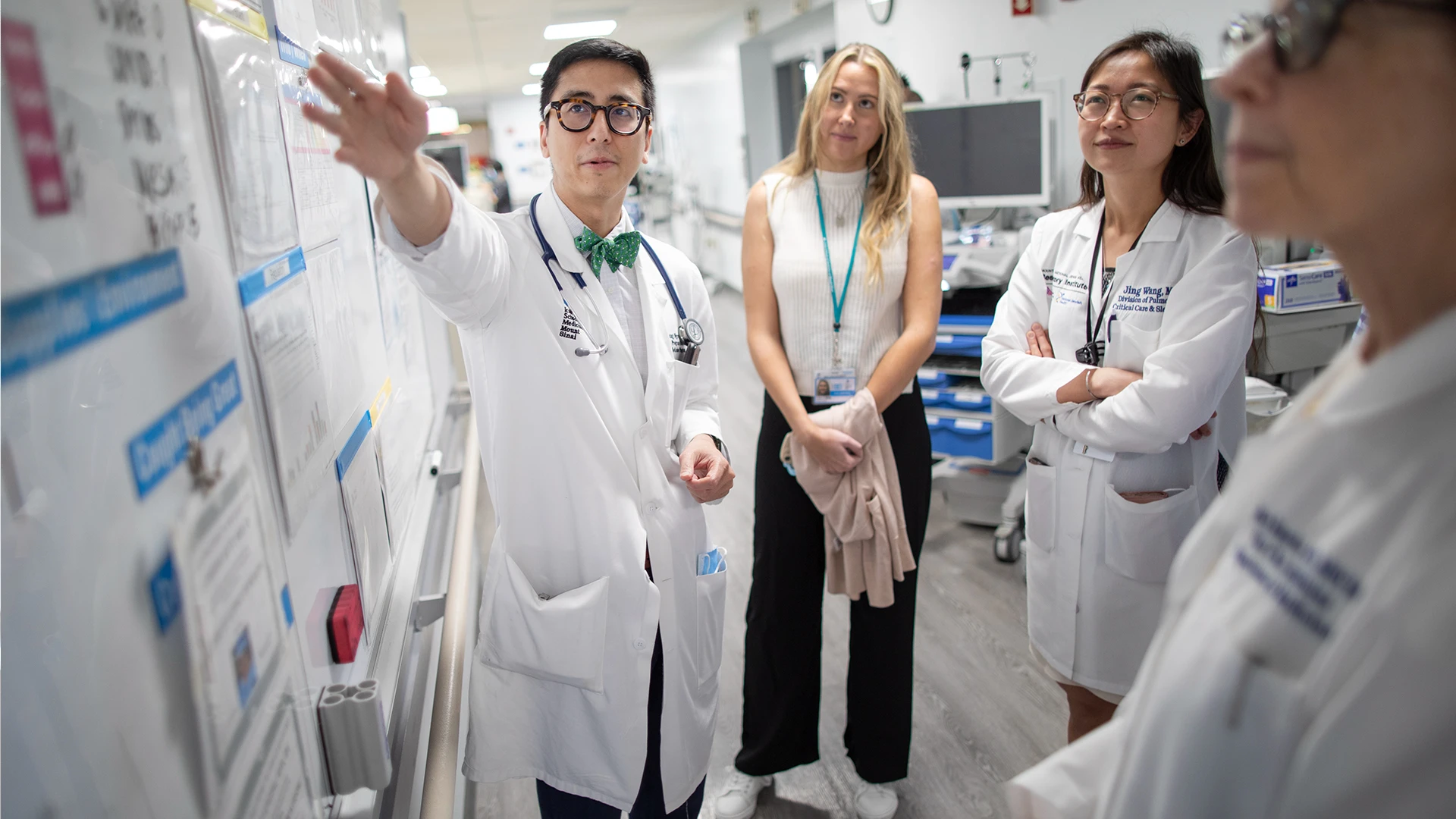From chronic disease screening to mortality review to hypertension control, the Department of Medicine’s Office of Quality and Patient Safety at Mount Sinai Health System has been extraordinarily active, bringing more than 100 post-pandemic projects to fruition that have achieved widespread improvements in the performance of services, systems, and processes that directly impact the quality of care provided to patients.
“These projects were successfully managed by our 38 Quality Champions who work closely with faculty, fellows, and residents at our hospitals,” says Beth Raucher, MD, Professor of Medicine (Infectious Diseases) at the Icahn School of Medicine at Mount Sinai and System Vice Chair for Quality and Clinical Affairs. “In the case of screening, monitoring, and educating patients with chronic disease, for example, that commitment translated into outstanding results by building best practices and quality measures into each program.” Dr. Raucher leads a team of quality and data specialists who support the projects at each of the hospitals.
Mortality review reflects the breadth and depth of these initiatives. Led by on-site Quality Champions, each hospital death triggers an intense review to determine whether all standards of care were met and where opportunities to improve systems of care may lie. At the center of this process are the Quality Improvement Peer Review Committees at each hospital, which meet monthly to review cases referred to them after an initial review by a faculty member in the Division of Hospital Medicine.
“What makes our program unique is that residents, interns, nurses, and other hospital staff are brought into the review process in a collaborative, safe, and transparent learning environment,” observes Vinh-Tung Nguyen, MD, Co-Chair of the Quality Improvement Committee at The Mount Sinai Hospital. “We disseminate these lessons learned through improvement projects, didactics, or written policy changes based on our findings.”
The Office of Quality Improvement and Patient Safety also seeks to prevent future quality and performance missteps by daily monitoring of an internal website that reports safety concerns over the previous 24 hours—events that range from the seemingly trivial (a patient’s broken TV) to the more concerning (a patient who falls, or is given wrong medication). “Oftentimes we’re on top of these events before the hospital is,” says Umar Jalloh, MPA, Manager of Performance Improvement and Research, and a member of Dr. Raucher’s team who conducts the surveillance and briefs site quality leaders in the early morning for potential follow-up.

From left: Vinh-Tung Nguyen, MD; data analyst Haley Waite; Jing Wang, MD, Co-Chair of the Quality Improvement Committee at The Mount Sinai Hospital; and Beth Raucher, MD, reviewing the quality priority metrics for the hospital's 10 West unit on the daily management board.
In a more proactive vein, the department’s quality and safety teams work to improve chronic disease management through robust efforts to control hypertension, diabetes, and hepatitis at each Mount Sinai hospital.
In the case of hypertension, for example, Amy Rosenberg, MD, Associate Chair for Administrative Affairs, Department of Medicine at Mount Sinai Morningside and Mount Sinai West, observed that one of the quality projects focused on provider education by consistently reminding the professional staff about tools available to help them improve blood pressure management. These include remote home monitoring of patients with higher-than-normal blood pressure, as well as telehealth counseling to ensure they remain on their medications. Another tool is direct telephone outreach to uncontrolled hypertensive patients with the goal of bringing them back to the office for follow-up checks by either a provider, nurse, or clinical pharmacist. Mount Sinai Morningside and Mount Sinai West achieved tremendous success with their programs by bringing at least 70 percent of hypertensive patients under the goal of 140/90 in 2022. Other practice sites also reached comparable target compliance.
Decreasing hemoglobin A1C (HbA1c) levels of diabetic patients to less than 9 percent was a core goal of the quality team at Mount Sinai Beth Israel’s Division of General Internal Medicine. Certified Diabetes Educators were pivotal to this effort, instilling in patients best practices for managing their condition and preventing complications. Moreover, the diabetes care team employed continuous glucose monitoring to improve patient motivation and knowledge of how food affects blood sugar. Providers were also encouraged to schedule frequent appointments with patients to closely monitor their progress, while language interpreters were deployed to improve outreach and care to non-English speaking patients.
Identifying individuals with hepatitis B or C—who are often unaware they have the disease—was a priority for the quality team in the Division of Liver Diseases at The Mount Sinai Hospital. In a city where more than 91,000 people have chronic hepatitis C (HCV) infection, the Liver project team worked to increase the rate at which patients are screened and, consequently, treated for their infections. Part of this strategy involved alerting providers to new Centers for Disease Control and Prevention guidelines encouraging HCV testing for all adults over 18 at least once in their lifetime. Furthermore, providers were sent a list of screening-eligible patients with upcoming office appointments. HCV screening was also promoted to patients via social media and on monitors throughout the hospital campus. This project is now being rolled out to the other hospitals in the Health System.
The Division of Pulmonary, Critical Care and Sleep Medicine at The Mount Sinai Hospital helped decrease the amount of time patients need to wait for sleep testing by streamlining the scheduling workflow and optimizing Epic-referral work queues. Sleep studies are in high demand because they help to diagnose sleep disorders and can ultimately improve patients’ quality of life. Jing Wang, MD, Co-Chair of the Quality Improvement Committee at The Mount Sinai Hospital, explained, “Sleep studies shed light on the underlying causes of sleep disorders to help us identify tailored interventions that lead to more restful and rejuvenating sleep for our patients. Giving patients the tools to reclaim their nights leads to improved overall well-being and a higher quality of life.”
The Department has also achieved major improvements around osteoporosis evaluation and education of patients admitted with hip fractures. At Mount Sinai Morningside and Mount Sinai West, the quality team in the Division of Endocrinology, Diabetes and Bone Disease informed patients of fall risk and fall prevention, and patients were given nutritional advice about calcium and vitamin D upon discharge. At the same time, providers were encouraged to add fragility fracture and osteoporosis as diagnoses in their discharge paperwork, and to refer the patient to endocrinology for further evaluation and treatment.
Particularly impressive in terms of quality care improvement was what the Peter Krueger Clinic—part of the Institute for Advanced Medicine, which specializes in infectious disease treatment and management—achieved in viral load suppression for patients living with HIV. The clinic recorded a 67 percent reduction in the number of patients with unsuppressed viral loads through the third quarter of 2022, compared to all of 2021. Responsible for this dramatic shift were such interventions as active patient monitoring and outreach to patients to schedule appointments and to confirm they are taking their antiviral medications.
“The success of this program was shared by Peter Krueger with other sites within the Institute for Advanced Medicine and resulted in amazing across-the-board reductions in viral load,” says Patricia Dharapak, MD, Associate Professor of Medicine (General Internal Medicine, and Hospital Medicine), and Chief of Quality for the Department of Medicine at Mount Sinai Beth Israel. “It’s another great example of how our team of Quality Champions is significantly improving the well-being of patients across Mount Sinai through interventions that bring them up to the stringent standards our organization has set.”
Featured

Beth Raucher, MD
Professor of Medicine (Infectious Diseases); Vice Chair for Quality and Clinical Affairs, Department of Medicine

Vinh-Tung Nguyen, MD
Associate Professor of Medicine (Hospital Medicine)

Amy Rosenberg, MD
Professor of Medicine (Infectious Diseases)

Jing Wang, MD
Associate Professor of Medicine (Pulmonary, Critical Care and Sleep Medicine)

Patricia Dharapak, MD
Associate Professor of Medicine (General Internal Medicine, and Hospital Medicine)
